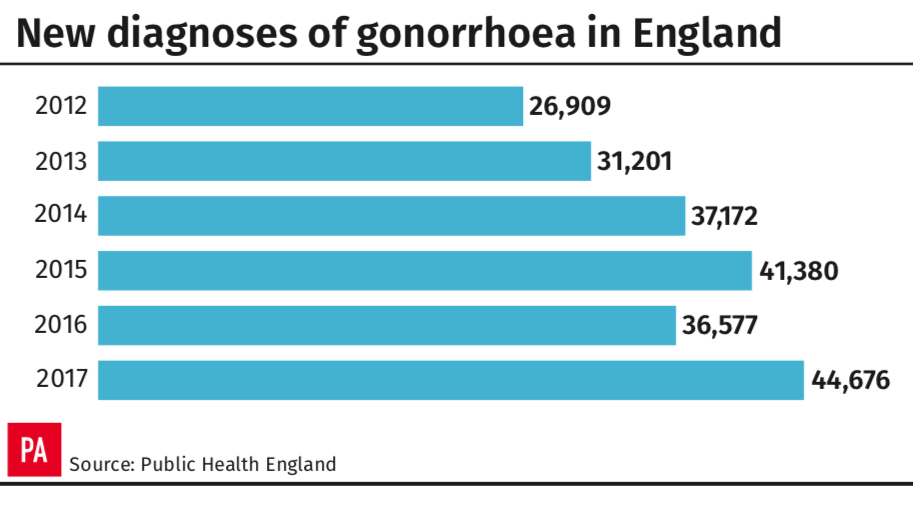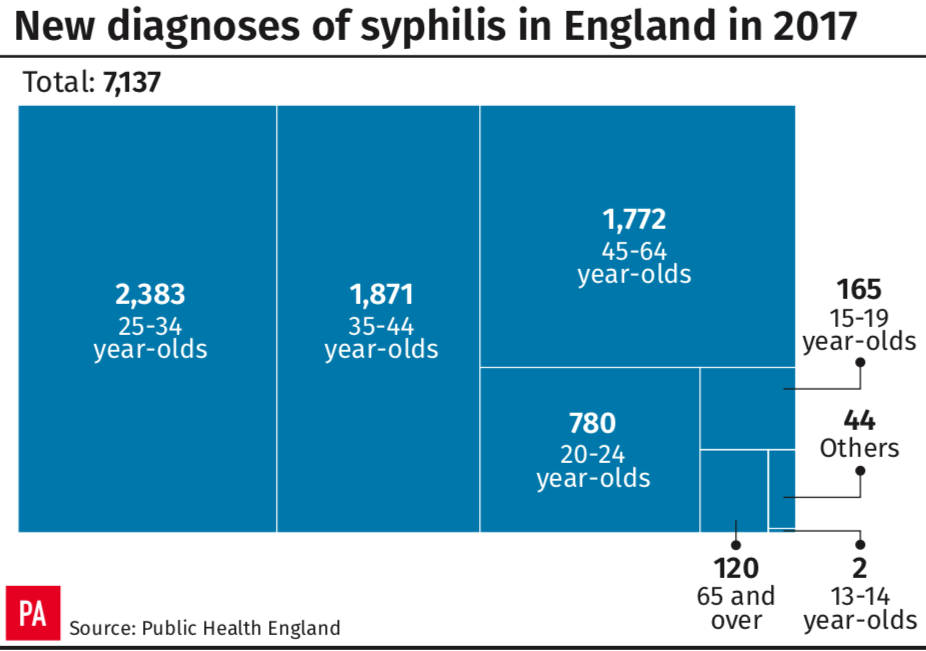Drug-resistant super-gonorrhoea 'could spread across the UK’ after 22% spike in cases in one year

Experts have warned that a drug-resistant super-gonorrhoea could spread across the UK after figures showed a 22% hike in the sexually transmitted infection (STI) in a single year.
A mutant strain of the infection – which can not be treated with the usual course of antibiotics – struck in Britain for the first time earlier this year.
Health officials now fear there could be more cases after recording 44,676 diagnoses of gonorrhoea in 2017 – a 22% increase on the previous year.
The report from Public Health England also told of a 20% year-on-year rise in deadly syphilis – a 148% increase on 2008 figures.
Debbie Laycock, from sexual health charity Terrence Higgins Trust, said: ‘Today’s stats confirm the number of STIs diagnosed in England remains worryingly high against a backdrop of damaging cuts to sexual health services.

‘Our sexual health services are stretched too thinly and demand outweighs availability, with more cuts already planned.
‘The significant rise in both syphilis and gonorrhoea shows why further cuts are completely unacceptable and would be extremely damaging, particularly given the emergence of a new extensively drug-resistant strain of gonorrhoea.’
The report warned that the 44,676 diagnoses of gonorrhoea in 2017 was of ‘concern given the recent emergence of extensively drug resistant Neisseria gonorrhoeae’.
MOST POPULAR TODAY ON YAHOO
Asteroid hits Earth just hours after being spotted by NASA’s ‘Planetary Defense’ system
Theresa May could be forced out ‘as soon as next week’ as Brexit splits cleave through party
It was seen for the first time in the UK earlier this year, when a UK man he picked up the disease after a sexual encounter with a woman in south-east Asia.
Two further cases were identified in Australia soon after.
Left untreated, gonorrhoea can lead to complications including infertility and pelvic inflammatory disease.

Pregnant women can also pass on the disease to their baby during labour.
The report added: ‘The large increase in gonorrhoea diagnoses between 2016 and 2017 is concerning due to the ongoing circulation of high-level azithromycin resistant gonorrhoea.
‘Additionally, the first detected case of extensively drug resistant Neisseria gonorrhoeae with resistance to ceftriaxone and high-level resistance to azithromycin, the two antibiotics used as front-line dual therapy, was detected in the UK in March 2018.
‘Soon after two cases with similar antimicrobial resistance profiles were later detected in Australia.
‘All three cases were associated with travel to south-east Asia.’

The newly-released report said that in 2017 there were 422,147 diagnoses of sexually transmitted infections made in England, around the same number that was reported in 2016.
More than 1.3 million chlamydia tests were carried out and over 126,000 chlamydia diagnoses were made among youngsters aged 15 to 24.
There was a 90% reduction in genital wart cases, mainly thanks to a high school immunisation programme, it said.
The impact of STIs remains greatest in young heterosexuals aged 15 to 24, black ethnic minorities, and gay and bisexual men, the report said.
Mrs Laycock added: ‘More work must be done to ensure people from these groups have access to the information and sexual health services they need to improve and look after their sexual health.’

 Yahoo News
Yahoo News 

